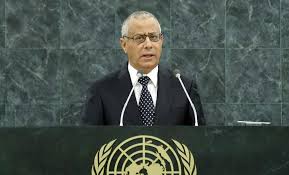 Prime Minister Ali Zeidan of Libya said on Friday that his kidnapping the day before by militia members was no different than a “coup” and had been orchestrated by opponents in the legislature who want to force him from office.
Prime Minister Ali Zeidan of Libya said on Friday that his kidnapping the day before by militia members was no different than a “coup” and had been orchestrated by opponents in the legislature who want to force him from office.
Scores of armed gunmen seized Mr. Zeidan from his hotel room in Tripoli early Thursday and released him nine hours later only under pressure from Defense Ministry officials and rival militias.
Mr. Zeidan, a former diplomat and human rights lawyer who has headed Libya’s interim government since last October, was unharmed, but the abduction underlined the weakness of his government against the militias.
In a televised news conference on Friday, Mr. Zeidan accused political opponents of trying to “overthrow the government.”
“This was not an attempted kidnapping only of a prime minister, but of the government,” he said, news agencies reported.
Mr. Zeidan has struggled with the militias and their leaders for months. The government’s efforts to push through reforms of the army and police forces and absorb the militias into state institutions has met with resistance from militia members, many of them veterans of the uprising against Col. Muammar el-Qaddafi, the longtime dictator.
Their leaders complain that they have been excluded from Parliament and government decision-making and left out of discussions on the future of Libya, in particular overhauls to the country’s security sector.
Armed groups frequently burst into government offices to register their complaints about unpaid salaries or bills. In May, militiamen besieged Parliament and a ministry building demanding the passing of a law against members of the Qaddafi government and calling for the government’s resignation.
After his release Mr. Zeidan called for wisdom to mend fences. But on Friday he appeared ready to confront those behind his abduction. He accused members of Parliament of plotting to remove him and using the militias for their political goals.
He said the armed men who abducted him told him they belonged to the Revolutionaries Operations Room, a security agency that was recently created out of several militias by Nouri Abusahmain, the head of the Parliament, known as the General National Congress, as a security force for the capital.
But the prime minister said Mr. Abusahmain, who visited him while he was held, was not involved, and he thanked him for his help in ensuring his freedom, The Associated Press reported.
Nevertheless the prime minister said the militias would not have acted against him without orders. “I do not think that more than 100 armed vehicles can seal off the hotel district to people without a command being given,” he said. “This bears the hallmarks of an attempted coup d’état against legitimacy.”
Despite the Libyan government’s apparent lack of authority and credibility, the International Criminal Court in The Hague on Friday showed enough trust in the country’s judicial system to drop its extradition request for Abdullah al-Senussi, who was the security chief for Colonel Qaddafi, as judges ruled that Libya could try Mr. Senussi at home.
In its decision, a three-judge panel said Libya had presented ample evidence that it was “willing and able genuinely to carry out” its own investigations and prosecute Mr. Senussi.
As a result, Mr. Senussi is likely to face a far longer list of serious charges at home, including killings and torture going back over decades when he was Colonel Qaddafi’s trusted operative. In The Hague, he was accused of crimes against humanity only during the early days of the uprising in 2011 that toppled the Qaddafi government.
Mr. Senussi’s lawyer, Ben Emmerson, said that the decision was shocking because the Libyan justice system was “in a state of collapse” and that the death penalty would be inevitable. The international court has no capital punishment.
NY Times

Leave a Reply
You must be logged in to post a comment.